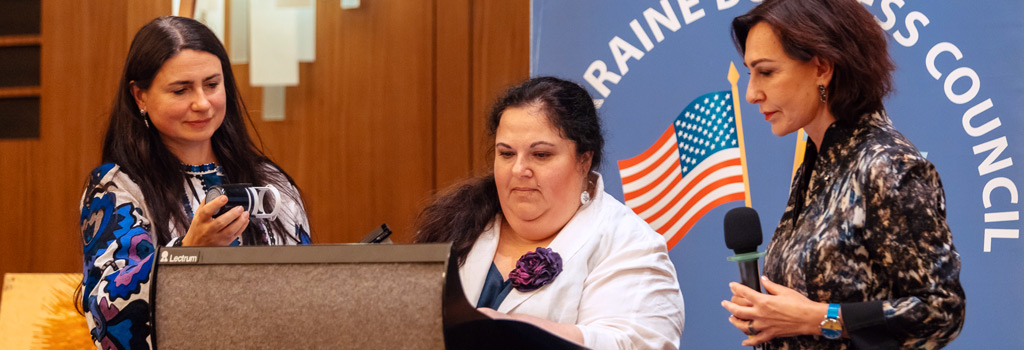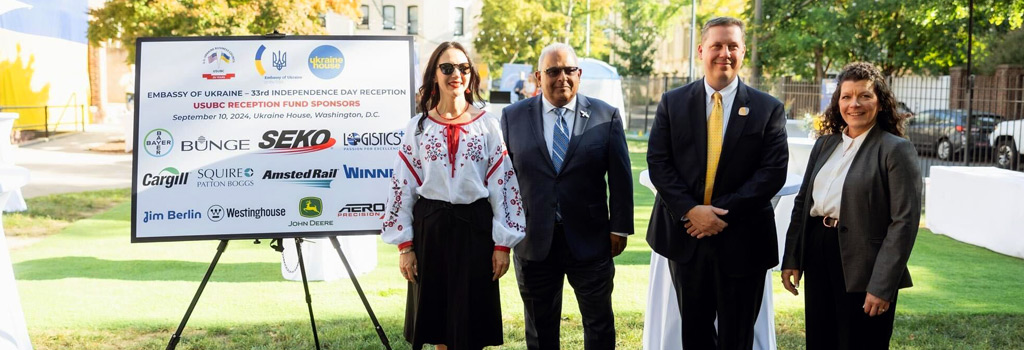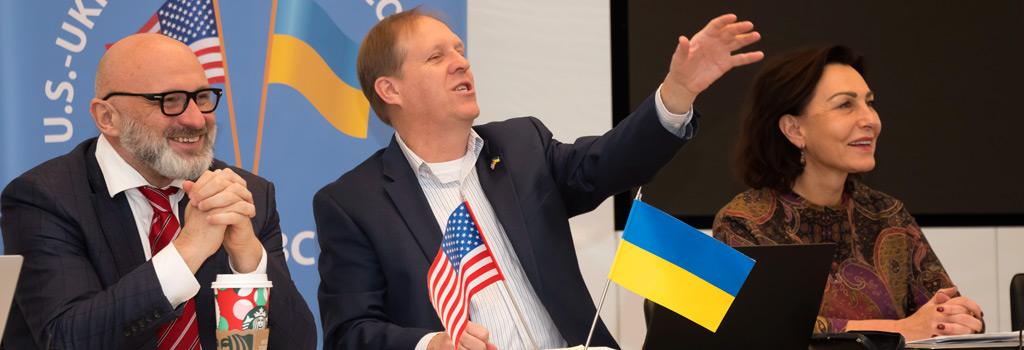Featured Galleries USUBC COLLECTION OF OVER 160 UKRAINE HISTORIC NEWS PHOTOGRAPHS 1918-1997
 Holodomor Posters
Holodomor Posters

INVITATION: "DOING BUSINESS IN UKRAINE 2010"
 Roundtable & Reception, Wash, D.C., Thursday, June 10, 2010
Roundtable & Reception, Wash, D.C., Thursday, June 10, 2010
U.S.-Ukraine Business Council (USUBC), Wash, D.C., Tue, May 25, 2010
TUESDAY, MAY 25, 2010
INVITATION: "DOING BUSINESS IN UKRAINE 2010"
ROUNDTABLE & RECEPTION, WASH, D.C.
3:30 to 5:45 p.m., Thu, June 10th, 2010, Reception 6:00 p.m.
The Kyiv based law firm, Frishberg & Partners, and the U.S.-Ukraine Business Council (USUBC), in cooperation with the Embassy of Ukraine to the United States, is sponsoring a "Doing Business in Ukraine 2010" Roundtable and Reception in Washington, D.C. on Thursday, June 10th, from 3:30 p.m. to 5:45 p.m., followed by a reception from 6:00 p.m. to 7:30 p.m.
You are invited to attend the Roundtable and Reception which will be held at the Embassy of Ukraine to the U.S., 3350 M Street, N.W., Washington, D.C..
There is no charge for the Roundtable or Reception but one must be registered to attend. Registration instructions are found below. Register today.
ROUNDTABLE SPEAKERS INCLUDE:
Speakers at the "Doing Business in Ukraine 2010" Roundtable in Washington will be the three key members, Alexander Paskhaver, Roman Popadiuk, and Alex Frishberg, of a new practice area recently established by the Frishberg & Partners law firm, to assist select clients in entering the Ukrainian market. Services include political and economic analysis, identifying strategic partners and acquisition strategies, government and media relations, due diligence and competition compliance.
Alexander Paskhaver heads the new practice area and is a long-time Ukrainian business, economics and political expert. Roman Popadiuk, was the first U.S. Ambassador to Ukraine and Alex Frishberg has been an attorney in Ukraine since 1991 and heads the Frishberg & Partners law firm (see speakers bios below). Moderating the Roundtable will be Morgan Williams, Director, Government Affairs, SigmaBleyzer Private Equity Management Group, who serves as President of USUBC.
IMPORTANT TOPICS TO BE COVERED:
The important topics to be covered during the "Doing Business in Ukraine 2010" Roundtable on June 10th in Washington, D.C. include:
[1] Political and Economic Analysis
[2] Identifying Strategic Partners and Acquisition Strategies
[3] Screening and Evaluating Viable Investment Opportunities
[4] Preparing, Entering and Establishing Presence in Ukraine
[5] Corporate Advisory and Market Entry Support
[6] Due Diligence, Anti-trust and Competition Compliance
[7] Government and Media Relations
ROUNDTABLE SPEAKERS BIOS:
[1] Alexander Paskhaver served as the Advisor on Economic Policy to the President of Ukraine, Prime Minister, deputy Prime Minister, Minister of Economy and to the Chair of the Ukrainian State Property Fund. Co-Author: the Law "On Privatization of State-Owned Enterprises;" the Law "On Small Scale Privatization;" the Law "On Privatization Certificates;" among others. Education: Institute of Economy of the Academy of Science of the USSR, Moscow (Ph.D., 1972). Editor: Bulletin "Privatization in Ukraine", Editor-in-Chief of "The Ukrainian Economic Monitor." Leading researcher: the Institute of Economics of the Ukrainian Academy of Sciences (1971-1992). Non-staff consultant to the World Bank, International Financial Corporation, USAID, Harvard Institute for International Development, the State Property Fund of Ukraine.
[2] Roman Popadiuk was the first U.S. Ambassador to Ukraine. He has successfully supported U.S. companies and individuals exploring various business opportunities worldwide. Mr. Popadiuk also served as Deputy Assistant to the President and Deputy Press Secretary for Foreign Affairs under President George Bush, a position he also held toward the end of President Reagan's administration. He is a retired member of the Senior Foreign Service and has received a number of awards, including the State Department's Superior Honor Award and the Meritorious Honor Award.
[3] Alex Frishberg is an attorney licensed to advise on privatization matters by the Ukrainian State Property Fund. Practiced law in Ukraine since 1991. Education: Washington University School of Law (J.D., 1988); University of Missouri, St. Louis (B.A., 1985). Co-Author: “Doing Business in Ukraine” (Juris Publishing, Inc., 1999). Professional Affiliations: D.C. Bar 1989-present; Chairman, Legal, Government Relations and Economic Committee, American Chamber of Commerce in Ukraine, 1992-1995 and 1999. Practice Areas: Mergers & Acquisitions, Joint Ventures, Privatization.
Frishberg & Partners is an independent full-service law firm based in Kyiv, Ukraine since October 1991. The firm's clients include Goodyear, KLM Royal Dutch Airlines, Baltic Beverages Holding, Emilceramica SpA, Vetropack Holding Ltd., Jahn General Products Ukraine, Lafarge, Tyco Electronics, Sun Microsystems, Hewlett-Packard, Fiat Auto, Philips Electronics, the Embassy of Great Britain, the Embassy of Belgium, Norway, the US Embassy, and the Embassy of Sweden, etc.
ROUNDTABLE REGISTRATION:
There is no charge for the "Doing Business in Ukraine 2010" Roundtable or Reception but one must be registered to attend. To register your attendance just send an e-mail to mwilliams@usubc.org stating you will attend the Roundtable. Please register as soon as possible as space is limited.
For additional information about the Roundtable contact Iryna Teluk, 240 505 9494, iteluk@usubc.org; or Lada Pastushak, 202 538 4160, lpastushak@usubc.org at the U.S.-Ukraine Business Council (USUBC).
"DOING BUSINESS IN UKRAINE 2010"
ROUNDTABLE & RECEPTION
3:30 to 5:45 p.m., Thu, June 10th, 2010, Reception 6:00 to 7:30 p.m.,
Embassy of Ukraine to the U.S., 3350 M Street, N.W., Washington, D.C.
Sponsored by Frishberg & Partners and the U.S.-Ukraine Business Council (USUBC)
To Register Send Confirmation of Attendance E-mail to mwilliams@usubc.org.
==============================================================
"DOING BUSINESS IN UKRAINE IN 2010"
Analysis & Commentary: By Alex Frishberg, Attorney
Frishberg & Partners, Kyiv, Ukraine, May 2010
In the early 1990’s, investing in Ukraine depended heavily on politics. During the Kravchuk and Kuchma eras, large foreign investors worked closely with the government structures such as the State Property Fund, and were always cognizant of the importance of preserving that relationship. Then came the Orange Revolution, and the role of the government became practically irrelevant to foreign companies.
For the local businessmen, the Orange Revolution also created a unique environment where near-complete lack of supervision by the government authorities put Ukraine firmly onto the Sicilian economic path. Ordinary businessmen, both foreign and local, became wealthy practically overnight.
Of course, these developments were excellent news for the lawyers, and so in a short few years the Kiev legal scene changed rapidly to accommodate the growing segment of newly rich businessmen. Foreign law firms started to dominate the market. In a few short years, at least four German law firms entered Ukraine to compete for German-speaking clients, including CMS McKenna, Norr Stiefenhofer Lutz, Beiten Burkart and Arzinger.
Numerous English-speaking law firms have also opened their offices, including London’s heavyweight, Clifford Chance. The bulk of the work revolved around numerous “hot deals,” creating massive M&A and real estate practices throughout Kiev-based law firms.
And then came “the perfect storm:” first, the global economic crisis emasculated M&A and real estate, the two most lucrative practice areas that generated so much profit for lawyers. Second, the Ukrainian Presidential elections stalled most large-scale investment deals until the election of the new President. The effects of this perfect storm can still be felt in almost all Kiev law firms. The two factors, responsible for this lingering effect, remain the same: (a) lack of economic recovery and (b) the arrival of the new Yanukovych administration (i.e., politics).
Today, the slow pace of economic recovery is frustrating for both businessmen and lawyers alike. At the same time, the tools necessary for improvement are in place: for better or for worse, the new administration consists of wealthy businessmen and former Kuchma administration officials, who know very well how to run a country. Unlike the previous schizophrenic government, which was co-headed by Yulia Tymoshenko and Victor Yuschenko, the current leadership has no real opposition. This is vital to foreign investors, who were previously held hostage to the constant in-fighting amongst members of the same government.
The new government arrived during the global economic crisis, but for investors there are two sides to this coin: on the one hand, the Ukrainian economy is in a terrible state (though not as bad as Greece). On the other hand, it is precisely at this time that foreign investors can afford to purchase the assets they could not have dreamed about only a few short years ago.
The sad reality, however, is that investors are not rushing into Ukraine as they once did. Instead, today the single biggest foreign investor appears to be Russia, a large and aggressive neighbor that is quickly acquiring Ukraine’s strategic industries such as oil/gas and nuclear power by any means possible (to assure re-unification).
In the oil and gas sector, for instance, the M&A transaction envisions either a merger of Ukrainian Naftogaz into its Russian counterpart, Gazprom, or the break-up of Naftogaz into separate companies that will be controlled by Russia and various Ukrainian businessmen close to the current administration. In the nuclear sector, the enormous M&A deal will involve unification of the two countries’ nuclear sectors.
From a legal standpoint, at least one joint venture will be set up to unite generation, nuclear engineering and nuclear fuel cycles, plus Russia will extend a rather large loan (to be repaid by the future generations) for construction of two nuclear reactors and one plant that will produce nuclear fuel (which could be exported to other countries).
Under any other circumstances these M&A deals would result in a lot of lucrative legal work, but from a practical viewpoint, no private law firm will handle either of these highly political transactions. Moreover, at least one well-known foreign investor, namely Westinghouse, was promptly removed from competition against Russia’s TVEL, proving once again that no private company (regardless of its size or fame) can compete with big-game politics.
So what does all this mean for the lawyers? Nothing good in the short run. The foreign investors are not coming in, and the Yanukovich administration is not doing very much to attract them. Admittedly, in the first few weeks after being elected Yanukovich has lowered the minimum capital of limited liability companies to an absurdly low level, encouraging formation of legal entities. He has also abolished the mandatory registration of foreign investments instilled by the former government, and relaxed rules regarding early repayment of certain loans.
On the other hand, Yanukovich has been trying to significantly increase the thresholds for those companies who elect the unified tax, effectively prohibiting a number of small and mid-size companies from taking advantage of this low, flat tax rate. Naturally, none of these steps have attracted any investment.
As in the 1990’s, politics once again plays a dominant role in Ukraine’s business affairs, often to the detriment of foreign investors. Like in the good old Kuchma days, well-connected lobbyists and consultants will soon become an indispensible link between the investors and their lawyers. Perhaps doing business (and practicing law) under the incapacitated Orange government was not so bad after all?
NOTE: Article above is an Analysis & Commentary OP-ED written By Alex Frishberg, Attorney, Frishberg & Partners, Kyiv, Ukraine, May 2010.

















